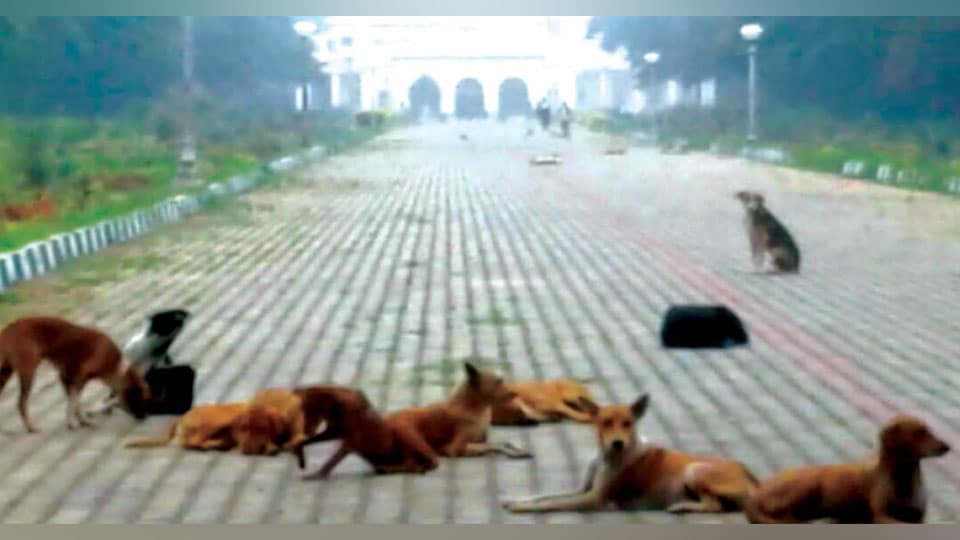There is stray dog menace in the city with each locality having tens of dogs on streets terrifying people, biting them and causing accidents. Veterinarian Dr. C. S. Arun discusses about Rabies and answers common questions that confront people when they are faced with dog bites. — Ed
By Dr. C.S. Arun, M.V.Sc.
Rabies is the most discussed disease of animals, as it is communicable to human beings and is almost always fatal. There are only seven recorded cases of human rabies survivors in the world. It is the tenth biggest cause of death due to infectious diseases worldwide. In India, every year 1.7 crore people are bitten by dogs resulting in death of more than 20,000 people. Post-bite treatment costs our economy more than Rs. 150 crore per annum. Here are a few questions raised by people that I will try to answer:
Q: What causes Rabies?
A: Rabies is caused by a virus belonging to Rhabdoviridae family.
Q: Which are all the animals susceptible to Rabies?
A: All warm-blooded animals are susceptible to Rabies. It is more common in wolves, jackals, raccoons, coyote, dogs, cats, rats, bats, monkeys, mongoose, horses, donkeys and cattle.
Q: How is this disease transmitted?
A: Rabies virus is transmitted via the saliva of infected animal through bite or wound contamination. There are very few instances of disease transmission through organ transplantation. It is not a contagious disease.
Q: What is the time gap between the bite and appearance of clinical signs?
A: Incubation period in Rabies varies from a few days to few years. It depends on the viral load in saliva, depth of bite, degree of innervations at site of bite and immune status of the animal.
Q: What are the clinical symptoms of Rabies?
A: Rabies gets expressed in two forms — Furious form and Dumb form.
Symptoms seen in Furious form are excitement, continuous bellowing or barking, excessive salivation, phobia towards light and water etc. Once these signs set in, death is inevitable within a week’s time.
In Dumb form of Rabies, affected animal will be dull, listless, seek seclusion, anorectic and may not make any sound. Disease course may be longer here. It is difficult to suspect Rabies incidence in this form.
Q: How to diagnose a case of Rabies?
A: Diagnosis of Rabies is based on history of animal bite, clinical signs, biological tests and post-mortem examination of brain in the laboratory.
Q: Is there any treatment for Rabies?
A: Once the clinical signs start, there is no treatment for Rabies. However, the following measures have to be taken immediately in case of an animal bite:
* Wash the wound thoroughly with soap and running water.
* Apply antiseptics like alcohol, povidone iodine, Dettol or Savlon.
*Don’t bandage or suture the wound as far as possible.
*Seek professional help immediately for administration of anti-rabies immunoglobulin and anti-rabies vaccine (ARV).
Q: How to prevent Rabies?
A: Preventive measures include timely vaccination for all pet animals against Rabies as per the veterinarian’s advice, prompt treatment for animal bite cases, stray animal population control and mass education.
Q: What is the preventive vaccination schedule for pet dogs and cats?
A: Puppies and kittens have to be vaccinated against Rabies first at 8 weeks of age, a booster after 3 weeks and thereafter every year.
Q: Do we have to take ARV if a vaccinated pet bites us?
A: No. If the pet is vaccinated properly and the efficacy of the vaccine is confirmed by laboratory evidence, there is no need to take ARV. However, proper wound treatment is mandatory.
Q: Do we have to take ARV if a pet scratches us?
A: Scratches from a rabid animal definitely necessitate ARV administration because of possible contamination with saliva. Scratches from a pet need proper wound treatment.
Q: I am bitten by an unvaccinated pet dog. Is ARV necessary?
A: Yes. Start the ARV course of 0, 3 and 7 days. Watch the pet for 10 days. If he is healthy, you may stop the post-bite vaccination. But get the dog vaccinated promptly.
Q: I am bitten by a stray animal. What should I do?
A: Apart from prompt wound treatment, seek medical help to get injected with anti-rabies immunoglobulin locally at the site of bite and a course of ARV on days 0, 3, 7, 14 and 28. If it is possible to observe the stray animal, watch him for at least 10 days.
Q: Is accidental consumption of milk or meat from Rabies affected animal dangerous?
A: Rabies virus may get excreted in milk also to a lesser extent. It won’t survive in temperatures >8 degree Celsius. So boiled or pasteurised milk and cooked meat are safe to consume.
Q: Is ARV safe? Are there any side effects?
A: ARV is an inactivated vaccine and hence there is no pathogenecity due to vaccination. Modern day cell culture vaccines don’t have any side effects. However, transient fever and a local swelling may be observed in a few cases.
Q: Is ARV safe for pregnant and lactating animals?
A: Yes, ARV can be safely administered to pregnant and lactating animals also.
Q: My pet is vaccinated long back. Can it be vaccinated now?
A: Yes. He has to be vaccinated now and preferably again after 21 days to ensure proper immunity.








i think these stray dogs must be cauhgt and then leave them in remote forest.